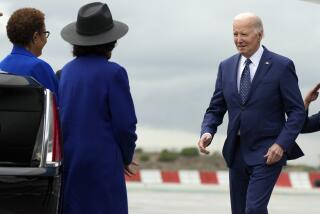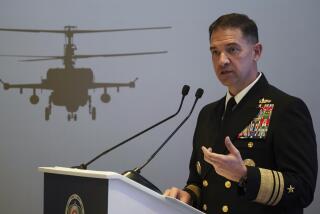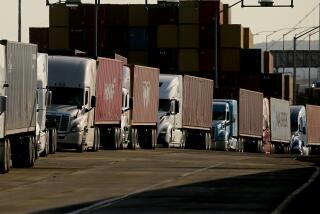New Security Efforts Lagging at Some Ports
- Share via
WASHINGTON — While the vast majority of U.S. port facilities are set to meet a Thursday deadline for new security standards, experts said Tuesday that inadequate government funding had slowed efforts to secure some of the nation’s harbors.
The increased security measures -- which apply to U.S. ports and to U.S.-bound vessels from overseas -- were approved after the Sept. 11 terrorist attacks.
Under the new standards, the nation’s 361 ports must have a Coast Guard-approved security plan, including annual emergency drills and appointment of a designated security officer. All cargo will eventually have to go through radiation detection devices.
Under a treaty signed in 2002 by 148 countries, foreign ships headed to the United States will be required to carry a security officer, display identification clearly, have updated alarm systems and alert authorities 96 hours before arrival.
The Coast Guard has brought on 500 new personnel to enforce the regulations. Ships that fail a Coast Guard inspection or embark from a noncompliant port may be turned back.
Coast Guard officials in California said the state’s major ports were in compliance with the new measures. For security reasons, officials said they could not identify facilities not in compliance.
Smaller ports and shipping companies from developing countries are more likely to be caught unprepared -- or be unable to afford the changes required by the new measures, officials said.
“The major shipper, the major ports -- they’re going to be compliant,” said James Jay Carafano, a research fellow at the Heritage Foundation, a conservative think tank in Washington. “It’s not the Wal-Marts or the Targets that will get caught on this.”
However, now that plans have been drawn up, even larger ports are struggling to put the measures in place, said Jim White, executive director of the Maryland Port Administration. White said “fierce” competition in his region had kept the Port of Baltimore from investing in new technologies.
“There’s no way ports on the East Coast can absorb these costs,” he said.
White and other critics pointed to the $15 billion the airline industry received from Congress after Sept. 11, some of which was to improve security.
The administration has asked for $46 million for aid to the ports in the 2005 budget.
The Coast Guard put the total cost for implementing the regulations laid out by Congress in the 2002 Maritime Transportation Security Act at $7.5 billion over 10 years.
“The Coast Guard didn’t say that [money] should come from the federal government,” Carafano said. “It should come from the people who operate and use the port.”
Members of Congress have proposed assessing fees on cargo moving through U.S. ports to help pay for the costs.
However, at a discussion Tuesday on port security, Asa Hutchinson, the undersecretary for border and transportation security at the Department of Homeland Security, said new fees were “not on the table right now.”
Earlier in the day, Hutchinson reported on another security initiative.
He said that after vetting 450,000 domestic and foreign airline employees, the Department of Homeland Security had identified 12 who were considered high risks and would be denied entrance to the United States.
Nine of the 12 were flagged because they were believed to have a connection to terrorist organizations, two were in possession of fraudulent passports and one had been charged with assault against a U.S. law enforcement officer.
The department would not release the names, positions, employers or nationality of any of the people on the list.
A similar screening of truck drivers who deliver hazardous materials yielded 29 names. That list is still under review, and further criminal background checks will follow, Hutchinson said.
More to Read
Sign up for Essential California
The most important California stories and recommendations in your inbox every morning.
You may occasionally receive promotional content from the Los Angeles Times.














